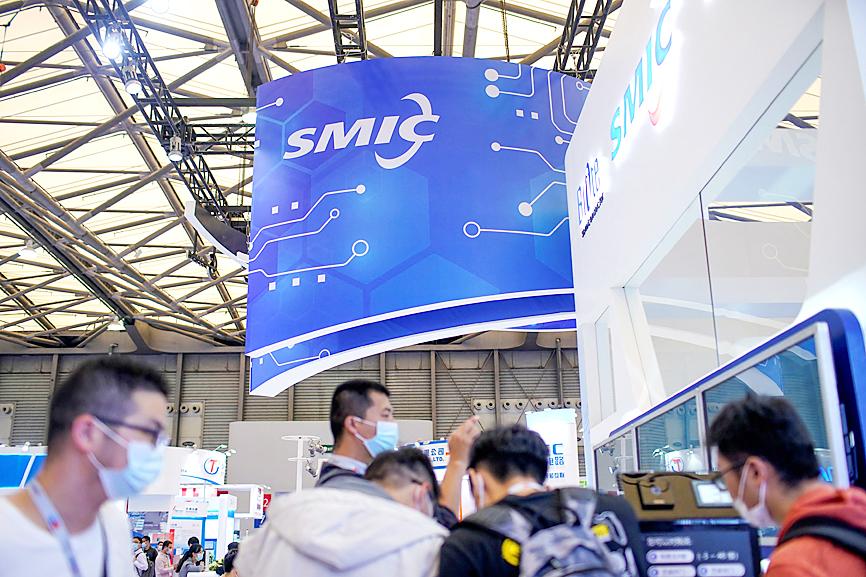Semiconductor Manufacturing International Corp (SMIC, 中芯) has likely advanced its production technology by two generations, defying US sanctions intended to halt the rise of China’s largest chipmaker.
The Shanghai-based manufacturer is shipping bitcoin-mining semiconductors built using 7 nanometer technology, industry watcher TechInsights wrote in a blog post on Tuesday.
That would be well ahead of SMIC’s established 14 nanometer technology, a measure of fabrication complexity in which narrower transistor widths help produce faster and more efficient chips.

Photo: Reuters
Since late 2020, the US has barred the unlicensed sale to the Chinese firm of equipment that can be used to fabricate semiconductors of 10 nanometers and beyond, infuriating Beijing.
A person familiar with the developments confirmed the report, asking not to be named as they were not authorized to discuss it publicly.
SMIC’s surprising progress raises questions about how effective export controls have been, and whether Washington can thwart China’s ambition to foster a world-class chip industry at home and reduce reliance on foreign technologies. It also comes as US lawmakers have urged Washington to close loopholes in its Chinese-oriented curbs and ensure Beijing is not supplying crucial technology to Russia.
The restrictions effectively derailed Huawei Technologies Co’s (華為) smartphone business by cutting it off from the tools to compete at the cutting edge.
Previously, SMIC has said that its core capabilities stand at 14 nanometers, two generations behind 7 nanometers, which is about four years behind the most advanced technology available from Taiwan Semiconductor Manufacturing Co (台積電) and Samsung Electronics Co.
SMIC has worked with clients on technologies more advanced than 14 nanometers as early as in 2020, it said on an earnings call that year.
China-based MinerVa Semiconductor Corp, which is named as SMIC’s customer in the TechInsights report, showcases a 7 nanometer chip on its Web site and said mass production began in July last year, without specifying the manufacturer.
SemiAnalysis lead analyst Dylan Patel was first to note the report.
Representatives of SMIC and MinerVa did not immediately respond to requests for comment.
The labels attached to generations of chip production technology have become increasingly controversial as they no longer represent dimensions of the microscopic transistors that give chips their electronic function. Companies have accused each other of mislabeling their products to make them appear more advanced than they actually are.
While the ability to produce a small number of chips using the next level of production technique signals that a company is making technological progress, what determines economic viability — under normal circumstances — is yield, or the percentage of every production run that is successful.
Intel Corp, once the leader in production technology, stalled on one type of production for five years because it could not get enough viable chips to make it profitable to introduce that node into mainstream production.
However, SMIC is not operating under standard business conditions.
It is critical to China’s ability to produce chips domestically, as the US tries to undercut the country’s tech advancements. Beijing might be willing to subsidize losses at domestic competitors, including SMIC, out of fear that its companies would not have access to key components.

Sweeping policy changes under US Secretary of Health and Human Services Robert F. Kennedy Jr are having a chilling effect on vaccine makers as anti-vaccine rhetoric has turned into concrete changes in inoculation schedules and recommendations, investors and executives said. The administration of US President Donald Trump has in the past year upended vaccine recommendations, with the country last month ending its longstanding guidance that all children receive inoculations against flu, hepatitis A and other diseases. The unprecedented changes have led to diminished vaccine usage, hurt the investment case for some biotechs, and created a drag that would likely dent revenues and

Macronix International Co (旺宏), the world’s biggest NOR flash memory supplier, yesterday said it would spend NT$22 billion (US$699.1 million) on capacity expansion this year to increase its production of mid-to-low-density memory chips as the world’s major memorychip suppliers are phasing out the market. The company said its planned capital expenditures are about 11 times higher than the NT$1.8 billion it spent on new facilities and equipment last year. A majority of this year’s outlay would be allocated to step up capacity of multi-level cell (MLC) NAND flash memory chips, which are used in embedded multimedia cards (eMMC), a managed

CULPRITS: Factors that affected the slip included falling global crude oil prices, wait-and-see consumer attitudes due to US tariffs and a different Lunar New Year holiday schedule Taiwan’s retail sales ended a nine-year growth streak last year, slipping 0.2 percent from a year earlier as uncertainty over US tariff policies affected demand for durable goods, data released on Friday by the Ministry of Economic Affairs showed. Last year’s retail sales totaled NT$4.84 trillion (US$153.27 billion), down about NT$9.5 billion, or 0.2 percent, from 2024. Despite the decline, the figure was still the second-highest annual sales total on record. Ministry statistics department deputy head Chen Yu-fang (陳玉芳) said sales of cars, motorcycles and related products, which accounted for 17.4 percent of total retail rales last year, fell NT$68.1 billion, or

In the wake of strong global demand for AI applications, Taiwan’s export-oriented economy accelerated with the composite index of economic indicators flashing the first “red” light in December for one year, indicating the economy is in booming mode, the National Development Council (NDC) said yesterday. Moreover, the index of leading indicators, which gauges the potential state of the economy over the next six months, also moved higher in December amid growing optimism over the outlook, the NDC said. In December, the index of economic indicators rose one point from a month earlier to 38, at the lower end of the “red” light.